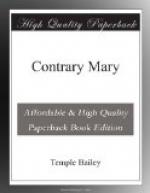Yet as she went away with Porter, and passed once more through the broad band of the street lamp’s light which made of her scarlet cloak a flaming flower, he looked after her wistfully, and wondered if when she had heard what he had to tell she would ever smile at him like that again.
Delilah, fresh from a triumphal summer, was in the midst of a laughing group on the porch.
As Mary came up, she was saying: “And we have taken a dear old home in Georgetown. No more glare or glitter. Everything is to be subdued to the dullness of a Japanese print—pale gray and dull blue and a splash of black. This gown gives the keynote.”
She was in gray taffeta, with a girdle of soft old blue, and a string of black rose-beads. No color was on her cheeks—there was just the blackness of her hair and the whiteness of her fine skin.
“It’s great,” Barry said,
Delilah nodded. “Yes. It has taken me several years to find out some things.” She looked at Grace and smiled. “It didn’t take you years, did it?”
Grace smiled back. The two women were as far apart as the poles. Grace represented the old Knickerbocker stock, Lilah, a later grafting. Grace studied clothes because it pleased her to make fashions a fine art. Delilah studied to impress. But each one saw in the other some similarity of taste and of mood, and the smile that they exchanged was that of comprehension.
Aunt Frances did not approve of Delilah. She said so to Grace going home.
“My dear, they live on the West Side—in a big house on the Drive. My calling list stops east of the Park.”
Grace shrugged. “Mother,” she said, “I learned one thing in Paris—that the only people worth knowing are the interesting people, and whether they live on the Drive or in Dakota, I don’t care. And we’ve an awful lot of fossils in our set.”
Mrs. Clendenning shifted the argument. “I don’t see why General Dick allows Leila to be so much with Miss Jeliffe.”
“They were at school together, and the General and Mr. Jeliffe are old friends.”
Her mother shrugged. “Well, I hope that if we stay here for the winter that they won’t be forced upon us. Washington is such a city of climbers, Grace.”
Grace let the matter drop there. She had learned discretion. She and her mother viewed life from different angles. To attempt to reconcile these differences would mean, had always meant, strife and controversy, and in these later years, Grace had steered her course toward serenity. She had refused to be blown about by the storms of her mother’s prejudices. In the midst of the conventionality of her own social training, she had managed to be untrammeled. In this she was more like Mary than the others of her generation. And she loved Mary, and wanted to see her happy.
“Mother,” she asked abruptly, “who is this Roger Poole?”
Mrs. Clendenning told her that he was a lodger in the Tower Rooms—a treasury clerk—a mere nobody.




